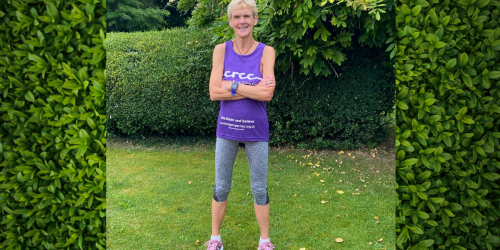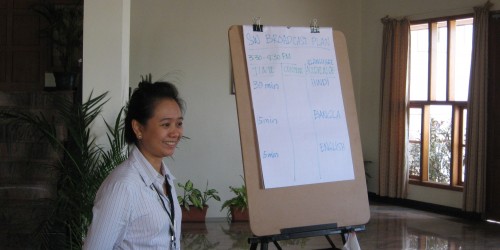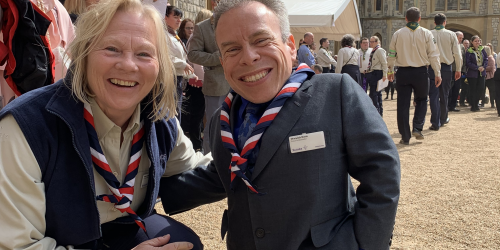
Ginny Davis takes us on a journey from mediocrity to practising at the Bar and publishing a novel
Lawyer, writer, actor, runner, and still the variety of challenges remain infinite
Alumna Chelsea Ljutic tells us about her career, how she got there, and how Lucy Cavendish helped
Chelsea (Education, 2016) is a Trade Commissioner for the High Commission of Canada in the United Kingdom. The focus of her current role is the education sector.
"The international education sector is ever-changing, but it continues to be an extremely lucrative trade sector for Canada. And, particularly in an age determined by shifting geopolitics, there is an even greater opportunity – and perhaps necessity – to continue to forge links (and maintain established relationships) between Canada and the UK in the realm of academic and research partnerships. I’m lucky in this role, because it is a marriage of my many interests – education, policy, business development, and research. As a Canadian, it is also a privilege to be able to serve Canada.
Being a member of Lucy Cavendish College was truly the highlight of my Cambridge experience. I remember feeling tentative at first when I received my acceptance to the college; I didn’t know much about the collegiate system and it wasn’t one of the old and renowned names to grace every Cambridge postcard or internet search. But I’m glad for that, because what I loved most about Lucy was that it was not pretentious, ostentatious, or exclusive. Lucy offered a sense of security, warmth, and friendship. But more than that, it offered an opportunity to be surrounded by a community of the most incredible, determined and inspiring women – something that shaped my sense of self-worth and confidence.
A great example was my time spent fundraising for the college during the telephone Campaign; I knew I was meant to be raising money, but sometimes I found myself unable to pull away from conversations with alumnae because I was just so blown away at how much these women had accomplished since leaving Lucy, despite the many intersectional barriers they have faced and continue to face. In addition, having opportunities like special dinners, lecture series and library elevenses – while simple – were a reminder that here was this incredible chance to socialise and ask questions of others leading the way.
While I by no means associate as a woman leading the way (or at least, not yet), I think I experienced a significant amount of self-growth at Lucy. Naturally, this has helped me to feel more comfortable in my own skin and allowed me the space to visualise myself in positions I hadn’t before. I carried that feeling with me when I asked for a higher salary in my first job after leaving Lucy, and I reminded myself of it throughout the entire application process for the job I have now – a job I went into feeling vastly unqualified for as a woman. I’m grateful for that – I Love Lucy!
Many of my colleagues working in international trade will have studied economics or trade policy or foreign affairs, and some of them might tell you that studying those subjects would be helpful to the job (which I’m sure they would be). However, I did not choose to get on this career path. Nor did I necessarily think five – or even three – years ago this is the path I would stumble onto.
Since beginning my undergraduate studies many years ago, I went from thinking I’d pursue a career in academia, to museum curatorship, to teaching, to the legal profession, to international development, back to academia again. And along the way, I encountered heaps of failure. I was rejected from over twenty entry level museum positions I applied for, I disliked teaching so much I dreaded going into work each day, I scored 2/25 on the psychometric tests required to be taken onto the legal graduate schemes, I completed a Master’s in international development only to realise it wasn’t for me, and all of this was while I was taking ‘time off’ before a PhD I never applied for. This is not to discourage any readers; rather, it is to reassure you that rejection and failure are normal and in some cases may be the best thing that could happen to you. In my case, failure and rejection helped me clearly see what I excelled at and actually determined a path for me.
I had absolutely no idea I would end up where I am, but each step and each challenge brought me closer to where I am now. And while I certainly developed some hard skills in each role along the way, I think that I am where I am because I have tried (through many tears) to remain flexible and open-minded, and willing to take on new challenges in areas vaguely related to my interests – or sometimes not related to my interests at all. I adapted, and the next adventure or opportunity seemed that much more exciting as a result.
It’s completely okay to have a clearly defined vision for your career, but that’s also a lot of pressure to put on yourself. Life is unpredictable, and it’s important to identify at this stage that you might have no idea where you are going until you actually arrive there. Your ‘career path’ might very obviously reflect your studies or extracurricular pursuits, and it might not. While I value my degrees and can write this through a lens of the immense privilege I was born into, I think it is worth saying that I have, over time, come to be far more appreciative of the soft skills I’ve developed along the way. Things like communication and creative thinking have served as the greatest contributors to the success I feel I have achieved now.
I guess my advice if you’re interested in my role – or any other role – is to be kind to yourself and to recognise that you are on a journey and that journey will inevitably include some mistakes, confusion, and especially some failure – which is not only normal, but vital to your success."

Lawyer, writer, actor, runner, and still the variety of challenges remain infinite

Lucy alumna Maria Baylon on her mission to empower marginalised people and level the playing field

An interview with Dr Ann Limb CBE DL Fellow Commoner, former visiting scholar Centre for Women Leaders* Lucy Cavendish College